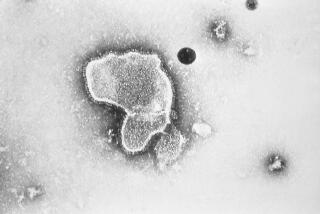AIDS Vaccine to Be Tested on Homosexual Volunteers
- Share via
WASHINGTON — Federal health officials announced Tuesday that testing of the nation’s first experimental AIDS vaccine on male homosexuals will begin soon and could lead to trial use on thousands of people by the mid-1990s if early results are successful.
They cautioned, however, that a cure for the fatal disease is still many years away.
The candidate vaccine, which cost millions of dollars to develop, initially will be given to uninfected homosexual volunteers in the greater Washington area. Scientists will monitor the test subjects for toxic side effects over a six-month period, said Dr. Anthony Fauci, director of the National Institute of Allergy and Infectious Diseases in Bethesda, Md.
If results of the first tests are satisfactory, later experiments involving 100 to 200 volunteers will establish the maximum dosage that can safely be given to humans, Fauci added. A final phase, not expected to begin for several years, would be mass testing to determine whether the product prevents the AIDS infection.
‘Important First Step’
“This is the first step of a long process that we’ve been talking about for a long time,” said Fauci, whose agency will carry out the tests. “At this stage, it’s too early to predict whether we will use this vaccine in widespread efficacy trials, but it’s a very important first step and we are quite optimistic.”
Scientists focused on homosexuals for the first round of tests because they are more likely to have engaged in “high-risk” activity that could affect response to the vaccine, Fauci said.
The vaccine, developed by MicroGeneSys, a Connecticut firm, is one of several experimental AIDS vaccines being reviewed by the Food and Drug Administration. Others are Oncogen, manufactured by Bristol-Meyers, and a vaccine made by the Institute for Immunological Disorders in Houston, an FDA spokesman said.
Federal officials said that the MicroGeneSys proposal was approved first because its application was received the earliest. The company is also seeking permission to test the experimental vaccine on a group of heterosexual volunteers in Canada, and hopes to compare those findings with the U.S. test results.
Franklin Volvovitz, president of MicroGeneSys, said that his firm’s scientists made the vaccine by stripping the protein coat that surrounds the AIDS virus and combining it with an insect virus to produce large amounts of the protein. The vaccine will succeed, he said, if it triggers production of antibodies that block the AIDS virus from infecting healthy cells.
Early tests of the MicroGeneSys vaccine have produced “very encouraging results” in many laboratory animals, including chimpanzees and Rhesus monkeys, said Dr. Gale Smith, a research scientist with the firm. Many of the animals registered strong antibody responses, a result that raised hopes that the product might prevent AIDS in humans, he said.
The vaccine also could prove to be a financial bonanza for its maker. MicroGeneSys, which says it spent “many millions” to develop the product, will hold the patents on the vaccine and pay royalties to the federal government for its technical contributions, Volvovitz said.
AIDS, or acquired immune deficiency syndrome, can be contracted through unprotected anal or vaginal intercourse with an infected partner or through use of intravenous needles contaminated with the virus. Once the AIDS virus invades the body, the immune system is greatly weakened and unable to fight off infections that frequently lead to death.
‘High-Risk’ Groups
More than 22,000 people have died of the disease in the United States since 1979, federal statistics show, and some scientists estimate that more than 1.5 million people may now be infected with the virus. Most of the those afflicted have been male homosexuals, intravenous drug users and their sexual partners.
In the initial experiment, 60 healthy, homosexual volunteers will take the MicroGeneSys vaccine in various amounts. To qualify for the test, volunteers must have sexual habits that place them in a “low-risk” category--preferably monogamous relationships with uninfected partners--and must agree to practice “safe sex” behavior during the experiment.
Scientists also will test the product on three heterosexuals with no history of high-risk behavior and compare those results with a control group of 18 homosexuals and three heterosexuals who did not receive the vaccine. The experiment is expected to take six months.
All of the volunteers will be monitored for a number of potential side effects, such as skin irritation, low-grade fever and muscle aches.
Although the volunteers would be injected with a portion of the AIDS virus, Fauci stressed that there is no chance that they could contract the disease from the vaccine. He explained that they would be inoculated only with the protein coating from the virus, “an inert substance,” rather than the active virus itself.
If the first phase of testing is successful, the second stage, to establish safe dosage levels, would be conducted at six federal laboratories around the country, also under the guidance of National Institute of Allergy and Infectious Diseases officials.
Barring further complications, scientists subsequently would test the vaccine to determine whether it could prevent outbreaks of the disease among otherwise healthy people.
Fauci cautioned that any discussion of mass testing is highly speculative, but suggested that thousands of people might be given the vaccine. Federal officials would have to consider the nature of the medical emergency at the time--including the extent to which AIDS had infected the heterosexual population--to determine who would receive the vaccine, he said.
Related story in Business.
More to Read
Sign up for Essential California
The most important California stories and recommendations in your inbox every morning.
You may occasionally receive promotional content from the Los Angeles Times.













